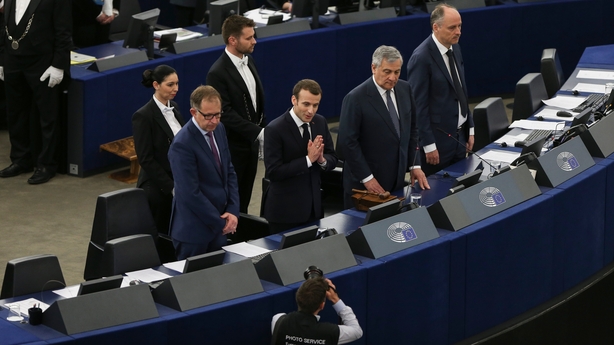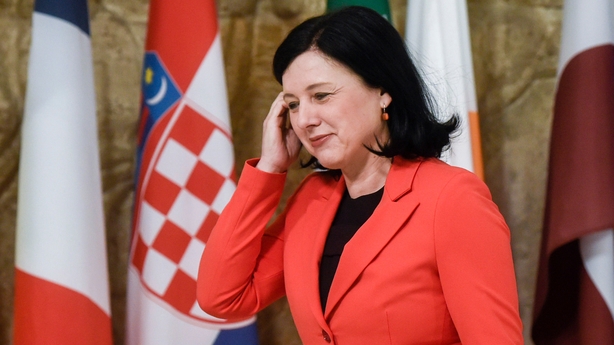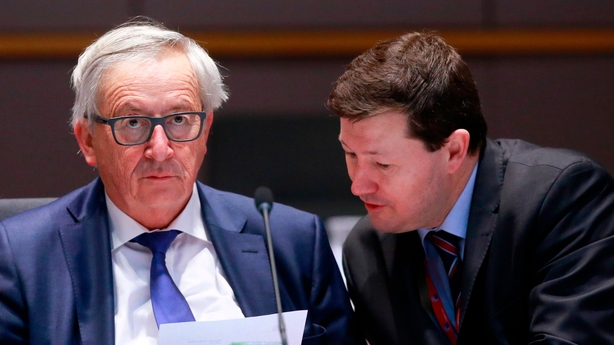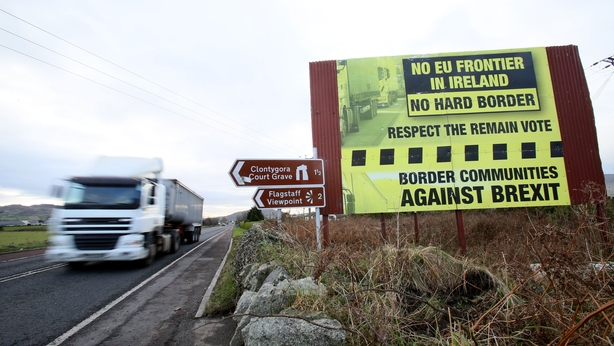MEPs made their monthly pilgrimage to Strasbourg last week. Here’s five things they got up to.
MEPs have Macron for lunch
The US political consultant Paul Begala once said "politics is show business for ugly people".
Whatever about the ugly part of that statement, in Strasbourg this week there was certainly a showbiz feel at the parliament on Tuesday with the arrival of Emmanuel Macron.
He ran the gauntlet of high fives and handshakes as he made his way through a crowd of often adoring MEPs to deliver an address on his vision for the future of Europe.
In a speech gushing with pro-European sentiment, he urged EU politicians to fight back against far right nationalists and said he did not want to belong to "a generation of sleepwalkers who have forgotten their own past".
Then he went and had lunch with, among others, Nigel Farage. It seems Mr Farage was charmed by the French President, describing him as "probably the EU’s last chance".

No likes for Zuckerberg at parliament debate
During his ten-hour grilling before Congress committees in Washington this month, the Facebook CEO Mark Zuckerberg was warned by one Republican politician to "be careful or we might have to regulate you".
Well, if he comes to Europe, he will likely be told to "be careful or we might have to regulate you even more".
This week, MEPs also wanted their slice Zuckerberg pie.
The parliament has written to the Facebook CEO calling on him to come and answer questions in Europe, which has more Facebook users than the United States.
The calls were supported by Irish MEPs Lynn Boylan, Brian Hayes and Séan Kelly. But EU politicians have adopted a smugness following the Cambridge Analytica scandal, which saw users private data harvested.
EU Justice Commissioner Vera Jourova (below) praised the union’s data protection laws, which are being tightened in the coming weeks, saying "we Europeans have got this right".

Appointment of ‘monster’ criticised
Who do you call when you want to call Europe? That’s the question famously asked by Henry Kissinger, and often quoted to illustrate the unwieldy leadership structure in the EU, which has three presidents (and a presidency held by a member state).
Well, if you are to believe press reports this week, the real power is held by a civil servant named Martin Selmayr.
He was given the job as head of the EU civil service following an unusual meeting of the college of commissioners last month in which he received a double promotion by being appointed as deputy secretary general and then elevated to secretary general in a matter of minutes.
The German lawyer is a former chief of staff hired by Jean-Claude Juncker and is known, affectionately it seems, as ‘the monster’. This week, MEPs criticised the manner in which Mr Selmayr was appointed.
The European Commission says he is staying in the job, however it agreed to reassess how appointment procedures can be improved in the future.

Tusk waves big Brexit stick at UK
It has been well covered at this stage, but the intervention of Donald Tusk, the EU Council President, during a Brexit debate in Strasbourg this week took many by surprise.
He warned the UK that there would be no transition deal, and no final settlement until the UK comes up with a solution to avoid a hard border with Northern Ireland.
The comments were warmly received by Mairead McGuinness MEP, who also invited colleagues to come and see the border area for themselves to understand the problems that would be caused by a hard border.
Her German colleague in the EPP Manfred Weber also expressed support for the statement, saying in a strong German accent "we are all Irish in this regard".

Organic five-a-day get the EU treatment
If you like your smashed avocado and organic smoothies instead of the full Irish for breakfast, then this EU law is for you.
Organic food, once considered niche, is now mainstream, according to the EU’s Agriculture Commissioner Phil Hogan.
He was in the parliament this week to see in new regulations to improve the quality of organic food and labeling on supermarket shelves across the EU. Irish MEP Marian Harkin also worked on this.
Under the regulations imports will have to comply with EU standards, meaning current laws that do not require imports to meet identical EU standards will be phased out within five years.
There will also be a requirement for farmers to have at least one on-site inspection each year to make sure that they are being, you know, organic.







